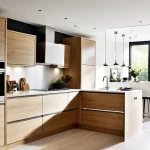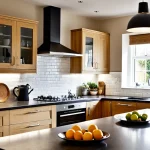Sustainability Principles Transforming UK Kitchen Renovations
Sustainability in UK kitchen design is rapidly becoming a top priority for homeowners who want eco-friendly kitchen practices to reduce environmental impact. This shift is driven by increasing consumer demand for greener solutions that combine functionality with responsibility.
Emerging sustainable kitchen renovation trends include the use of recycled materials, energy-efficient appliances, and water-saving fixtures. These approaches not only minimize waste but also align with evolving UK regulations promoting green building standards. For example, refurbished cabinetry and low-VOC paints are popular choices that meet stricter environmental criteria while enhancing indoor air quality.
Also to read : What are the key features of a minimalist UK kitchen design?
UK regulations now encourage projects to pursue green certification standards, ensuring kitchens meet sustainability benchmarks. These standards drive innovation and assure homeowners that their renovations contribute positively to the planet.
The benefits of sustainable renovation extend beyond environmental gains. Eco-friendly kitchen practices often lead to lower utility bills, improved durability of materials, and enhanced resale value. Homeowners who embrace these principles enjoy healthier spaces and demonstrate responsible stewardship, proving that smart sustainability is also smart investment.
Topic to read : How is the UK kitchen industry responding to sustainability challenges?
Eco-Friendly Materials and Resource Choices
Prioritizing sustainability in every component
Choosing sustainable kitchen materials is crucial for reducing environmental impact. Many homeowners now prefer cabinetry and worktops crafted from recycled materials or upcycled components. These options divert waste from landfills while offering unique aesthetics.
Using FSC-certified wood ensures that timber comes from responsibly managed forests, protecting ecosystems and promoting biodiversity. Such sustainably sourced timber is increasingly popular in kitchen designs for this reason. Alongside wood, finishes with low levels of volatile organic compounds (low-VOC finishes) are essential to improve indoor air quality and minimize harmful emissions.
Innovative alternatives like bamboo—a fast-growing, renewable resource—and reclaimed stone add both style and sustainability. Bamboo’s rapid growth rate makes it an environmentally friendly choice for flooring and cabinetry, while reclaimed stone salvages natural materials that would otherwise go unused.
By selecting these eco-friendly materials and focusing on resource-efficient options, homeowners contribute to a greener future without compromising on design or durability. This approach supports healthier homes and aligns with growing environmental awareness, helping to meet both practical needs and ethical expectations.
Energy-Efficient Appliances and Technologies
Energy-efficient kitchen appliances are becoming essential for reducing household energy consumption and environmental impact. Among these, A-rated appliances dominate the market due to their exceptional performance and low power usage. For example, induction cooktops use electromagnetic energy to heat pots directly, offering faster cooking times and up to 30% less energy consumption compared to traditional electric or gas stoves.
Smart kitchen technology enhances this efficiency by integrating automated controls that monitor and adjust appliance settings in real time. These controls effectively reduce unnecessary energy use, such as turning off ovens or refrigerators when not in use. Water-saving fixtures complement this by minimizing waste during everyday tasks like washing dishes or filling kettles, contributing both to energy and water conservation.
Advanced ventilation systems and LED lighting also play vital roles. Ventilation hoods with energy-efficient motors and smart sensors optimize airflow while consuming less power. Meanwhile, LED lights use approximately 75% less energy than incandescent bulbs and last significantly longer, improving both energy savings and kitchen ambience.
Together, these technologies and appliances support a sustainable kitchen environment, enabling homeowners to make eco-conscious choices without sacrificing performance or convenience.
Waste Reduction and Circular Practices
Waste reduction in kitchen renovations starts with choosing modular and easily upgradable cabinetry. These cabinets extend the kitchen’s lifespan by allowing parts to be replaced or updated without tearing out the whole unit. This approach not only minimizes demolition waste but also supports circular economy kitchens, where materials circulate longer in use instead of ending up in landfills.
Implementing effective kitchen recycling solutions is another key strategy. This includes designing dedicated recycling stations that separate plastics, metals, glass, and organic waste right in the kitchen. Incorporating composting systems reduces food waste, turning scraps into valuable nutrients for gardens, thus closing the loop in home waste management.
When renovating, consider reusing or donating old kitchen components such as doors, countertops, or appliances. Many organizations accept these donations, preventing perfectly serviceable materials from becoming waste. Alternatively, repurposing elements within the home—for example, turning old cabinets into storage units—helps conserve resources and reduce environmental impact.
By integrating these waste reduction in kitchen renovations practices, homeowners contribute to sustainability while enjoying a functional, eco-friendly kitchen space designed for longevity and responsible resource use.
Case Studies and Notable Projects in Sustainable UK Kitchens
Spotlighting innovation and impact
Several examples of sustainable kitchens across the UK highlight how eco-friendly design principles effectively reduce environmental impact while enhancing functionality. For instance, a notable case study involved a London-based renovation where reclaimed wood cabinetry and energy-efficient lighting were prioritized. This project achieved a 40% reduction in energy consumption compared to standard kitchens.
Leading design firms specializing in UK sustainable kitchen renovation case studies often incorporate materials like bamboo and recycled composites. One prominent firm paired these with smart water-saving fixtures, demonstrating best practices for minimizing resource use. Homeowners reported improved comfort and lower utility bills following these renovations.
Another example showcased a kitchen designed with modular elements, enabling easy upgrades and repairs, thereby extending the kitchen’s lifespan and reducing waste. Follow-up feedback emphasized the project’s success in merging aesthetic appeal with sustainable functionality.
These case studies serve as inspiring benchmarks, illustrating how thoughtful design and material choices can create kitchens that align with environmental goals. By examining measurable outcomes and homeowner experiences, they provide valuable insights into implementing best practices for sustainable kitchen renovations in the UK.
Regulatory Frameworks and Consumer Guidance
In the UK, kitchen sustainability regulations are increasingly shaping how homeowners approach eco-friendly renovations. Central to this are building codes that emphasize energy efficiency and the use of sustainable materials. These codes ensure that kitchens not only reduce environmental impact but also improve long-term cost savings.
To encourage green refurbishment, the government offers various eco-friendly renovation incentives, including grants and tax reliefs. These initiatives support projects that install energy-efficient appliances or opt for renewable energy sources, making sustainable kitchen upgrades more affordable.
When selecting materials and products, consumers should look for trusted labels such as FSC certification for responsibly sourced wood and endorsements from the Energy Saving Trust, which highlights energy-efficient devices suitable for kitchen use. These labels simplify choices and promote environmental responsibility.
For homeowners keen to maximize sustainability, partnering with specialists versed in sustainable kitchen guidelines UK is invaluable. Experts can navigate compliance with local codes while recommending products and practices that align with environmental goals. This collaboration ensures kitchens meet both regulatory standards and personal sustainability targets efficiently.
Long-Term Impact and Future Trends
The future of kitchen sustainability UK looks promising, driven by evolving consumer values emphasizing eco-friendly living. As awareness of environmental issues grows, ongoing trends indicate increasing consumer adoption of green kitchens. Homeowners increasingly demand energy-efficient appliances, sustainable materials, and waste-reducing features. These preferences are shaping kitchen design and procurement decisions across the UK.
Innovations play a key role in advancing next-generation sustainable kitchens. Developments in smart technology enable better energy management, while new materials like recycled composites and low-impact finishes reduce environmental footprints. Additionally, water-saving fixtures and integrated waste disposal systems are becoming standard in modern sustainable kitchens.
The business case for sustainability in the UK home sector strengthens, with companies recognizing economic benefits such as lower operating costs and enhanced brand appeal. This encourages investment in innovative products and services that support eco-conscious consumers. As legislation and incentives promote green building, the market shift towards sustainability will likely accelerate.
Understanding these factors helps homeowners and industry players anticipate how sustainable kitchen solutions will evolve. Embracing these ongoing trends ensures designs that are not only environmentally responsible but also practical and technologically advanced.


